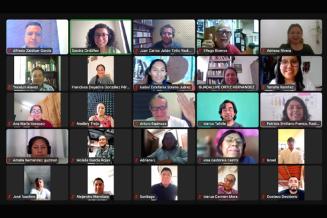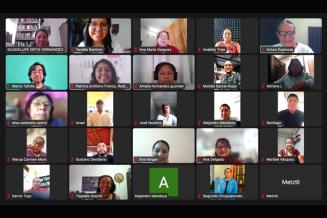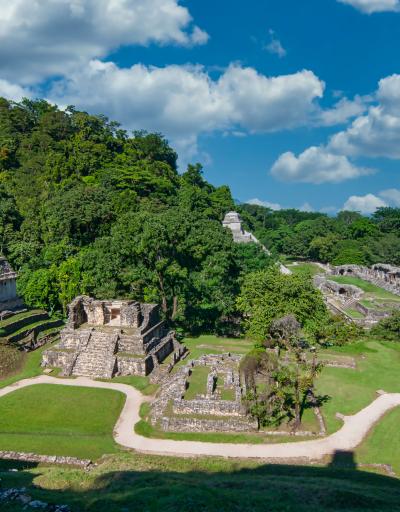
Virtual School for Indigenous and Community Media (VSICM)
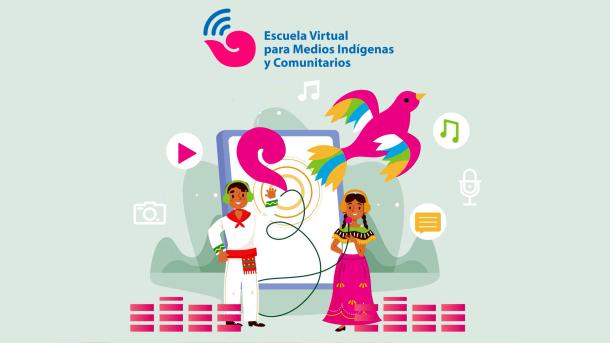
In October 2021, UNESCO Mexico proposed before members of Indigenous and Community Media, public media, civil society and government institutions, to develop a Virtual School for Indigenous and Community Media as a pilot project. This proposal was fed back by this group and it was agreed that the School would constitute a space for education, training and exchange of knowledge focused on the sustainability of the ICM. It was also accepted that regional diagnostic workshops (south, central and north) would be held to identify the training needs of the ICM.
About the project
The beginnings of this pilot project were implemented at the national level with the coordination of the UNESCO Office in Mexico and the support of the Division of Cultural Expressions of UNESCO, the financial support of the European Union and the direct collaboration with representatives of Indigenous and Community Media, mainly, as well as public media, government institutions, civil society and academic experts.
Once the School was formally established, the coordination of the project passed into the hands of the Indigenous and Community Media in order to appropriate it and sustain it over time. UNESCO Mexico continues supporting and accompanying this collective effort.
The Virtual School for Indigenous and Community Media is aimed mainly to media that are just emerging, but also includes those with short and long careers, in order to encourage the exchange of knowledge between experienced media and those who begin their indigenous and/or community communication projects.

In this way, the School pursues the following objectives:
- Motivate the learning and appropriation of the educational processes of the Indigenous and Community Media to strengthen their capacities of communication, production, management and dissemination of content.
- Strengthen regional links between the ICM to generate synergies and exchange knowledge to promote their cultural and linguistic diversity.
The training field of this Virtual School is focused on the sustainability of Indigenous and Community Media, as this is essential for indigenous communities and peoples to access to information and exercise their right to communicate. This is also fundamental for the permanence and strengthening of the ICM.
The sustainability approach proposed for the Virtual School is the one that Radio Teocelo, one of the oldest community radio stations in Mexico, has built for more than five decades. This model has been nourished by its experience, as well as by its observations and interactions with other indigenous and community radios. Its methodology is not intended to be a single recipe but a guide of adaptable strategies to sustain the ICM in time and space.
Fundamental axes of sustainability model
Knowledge of the legal and regulatory processes for the existence and sustainability of the ICM (indigenous and community concession procedures, laws and regulations on broadcasting and telecommunication) to guarantee the right of indigenous and community communication and access to information.
Knowledge of the management and accountability of resources within the ICM, as well as ways to procure and manage the external and internal contributions of human and material resources for the financial viability of the ICM.
Knowledge about the acquisition, use and maintenance of the equipment required to operate the ICM, as well as the development of communication skills and techniques for the creation and production of content based on the needs of the audiences.
Knowledge about the governance and forms of organization of the ICM human team for a good internal functioning, as well as the recognition of the community roots to provide a quality communication service to the audiences. It also includes the creation of and linkage with networks for the strengthening of the ICM.
In order to identify the specific needs of Indigenous and Community Media in relation to their sustainability, the following actions were undertaken:
- From November 2021 to January 2022: Legal and personalized advisory sessions to the ICM about the process of radio concession for indigenous and community use.
- From February 2021 to July 2022: Virtual and regional diagnostic workshops with ICM from the south, centre and north of the country. These workshops were spaces for the exchange of experiences and learning in order to know how the ICM have explored each certainty and which topics need more attention to strengthen their capacities.
As a result of these activities a diagnostic report was made, which systematized the main problems that the ICM need to address and that would be included in the contents of the Virtual School. In September 2022, a group meeting was convened with the participants of the mentioned activities to analyze the diagnostic report.
First generation of the Virtual School for ICM
Finally, after months of constant and arduous work, the call to register for the first generation of the Virtual School for Indigenous and Community Media was published in the World Radio Day 2023 (February 13). The call remained open from February 13 to 23, having a record of 82 participants.
The Virtual School was open to the students from February 27 to May 26 and there were four synchronous sessions with them: one of welcome, two of following-up of doubts and a last one of closing.
At the end of this first version of the VSICM, 33 students graduated from the 62 active participants.
The Administrator Group of the Virtual School is internally reorganizing to launch the second version of it. The Group remains in contact with the students of the first generation, who undoubtedly contributed greatly to this first effort and will continue supporting the following generations.
Administrator Group of the Virtual School for ICM

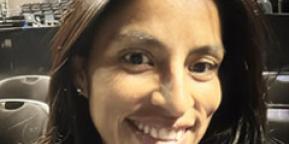

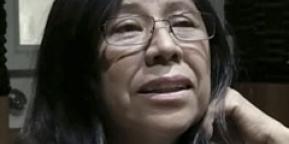

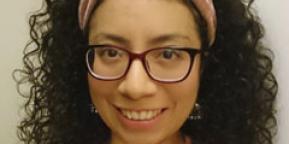

Administrator Group of the Virtual School for ICM
From September 2022 to February 2023, the Administrator Group received training from Talis Apud-Martinez, Co-founder and Executive Director of Crew, to learn how to use the platform and build the School. This group also worked on the curriculum, contents, dynamics and the call for the first version of the Virtual School.
Background
From 2020 to 2021, UNESCO and the Presidency of the Republic promoted the project "Design of public policies to support Indigenous and Community Media in Mexico and incorporate indigenous content in public and commercial media", which was enriched by the experiences and knowledge of the National Team, a group composed of representatives of government institutions, civil society, academia, public media and Indigenous and Community Media.
During the project there were numerous roundtables with the National Team about the situation of Indigenous and Community Media in the media ecosystem of Mexico. These discussions were key to generate an in-depth diagnosis of the ICM and a document of public policy recommendations for their strengthening.
One of the concerns raised in the dialogue tables was the importance of having training spaces that contribute to the sustainability of Indigenous and Community Media, considering that existing efforts are scarce and discontinuous.
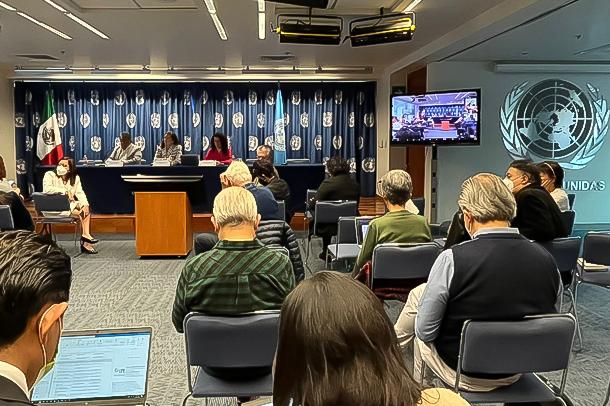
For this reason, in October 2021, UNESCO Mexico proposed before members of Indigenous and Community Media, public media, civil society and government institutions, to develop a Virtual School for Indigenous and Community Media as a pilot project. This proposal was fed back by this group and it was agreed that the School would constitute a space for education, training and exchange of knowledge focused on the sustainability of the ICM. It was also accepted that regional diagnostic workshops (south, central and north) would be held to identify the training needs of the ICM.


